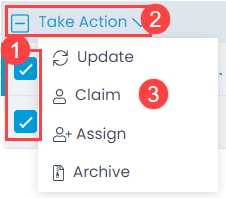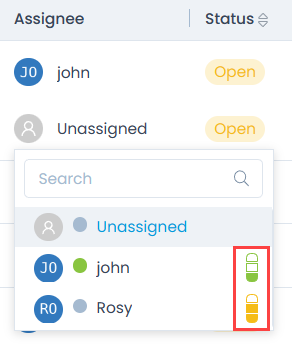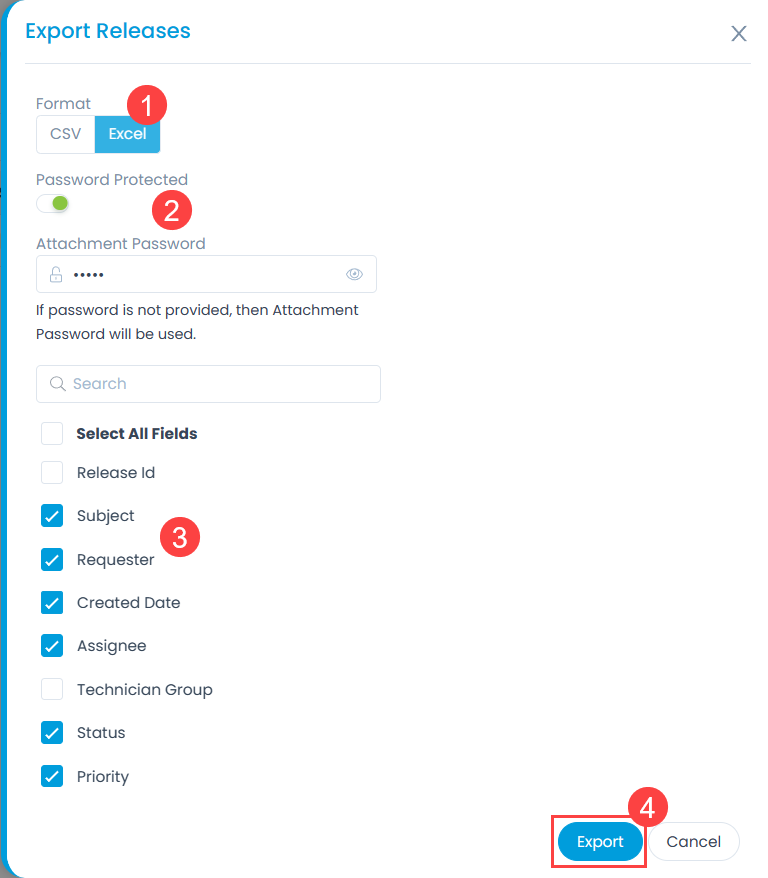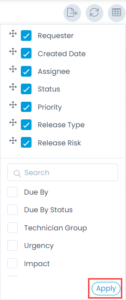Release List View
The Release List View allows technicians to track and manage all the releases at one place.
In the Release List View, you get to see all the available releases in the system. It is the center where a technician can find all releases and act upon it.
List View Page

- Filter: You can filter the releases by clicking the desired option. E.g.: If All Open Releases is selected, the grid displays all the releases with open status.
- Search: You can look for specific release by searching them. The search is a faceted search and allows you to search with specific criteria. The filter option uses a predefined criteria and segregates the list accordingly. You can find more details in the search section.
- Bulk Operations: You can select multiple releases and take the required action as shown below.

- Grid: Displays all the releases in the grid along with their details.
- View Requester Profile: You can view the profile of the requester.
- Assignee: You can change the assignee from the Assigned To column by clicking on the assignee's name and selecting the desired technician. The assignee with the Green icon indicates the assignee is Online while Grey indicates Offline. You can also know the load of the particular user based on the color of the load indicator (bar) on the right-hand side of the name. The color indicates the following:
- Green - Low
- Yellow - Medium
- Red - High

- Priority: You can change the priority of the release by clicking on it and selecting the required option. The options are: Low, Medium, High, and Urgent. The default value is Low.
- Release Type: You can change the type by clicking on it and selecting the required option. The options are: Minor, Standard, Significant, Major, and Emergency.
- Release Risk: You can change the risk of the release by clicking on it and selecting the required option. The options are: Low, Medium, and High. The default value is Low.
- Export: You can export the release list in CSV and Excel format. To do so,
- Click the Export button and a popup appears.
- Select the Format as CSV or Excel.
- If Excel is selected, you can enable the Password Protected option to secure the file. If enabled enter the Attachment Password. If not provided, the common password set from Edit User Profile page will be used.
- Select the desired fields to be included in the file.
- Click Export and a link to download the file is sent via an email.

- Download: You can download the release list in CSV and Excel format. Moreover, you can password-protect the Excel file for added security.
- Refresh: You can refresh the release list. This is useful when multiple people are working on the release and contents are updated frequently.
- Column Selection: You can select the columns to be displayed in the grid table as shown below.

More Options: You can click and select any of the below options:
- Auto Refresh Interval: Apart from the manual refresh, you can set the time interval, after which the Technician Portal page will get refreshed automatically. Thus, you don't need to click the refresh button repeatedly. It applies to the Request, Problem, Change, Release, Asset (Hardware, Software, Non-IT, Consumable), and My Task modules. Once selected, set the time interval after which the page will get refreshed everytime, and click Update. The timer will be visible on the screen.